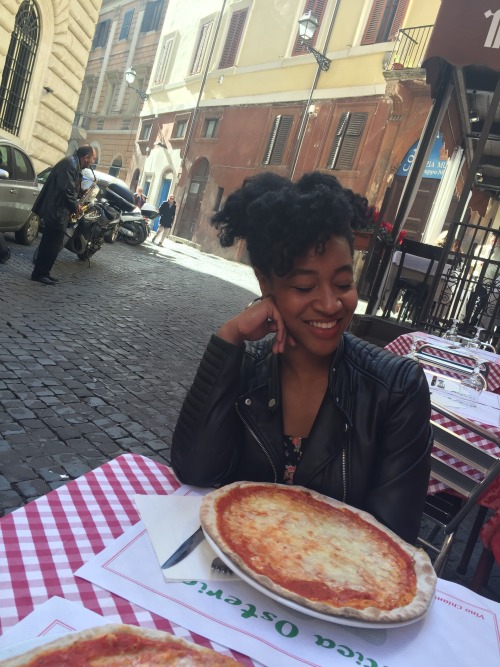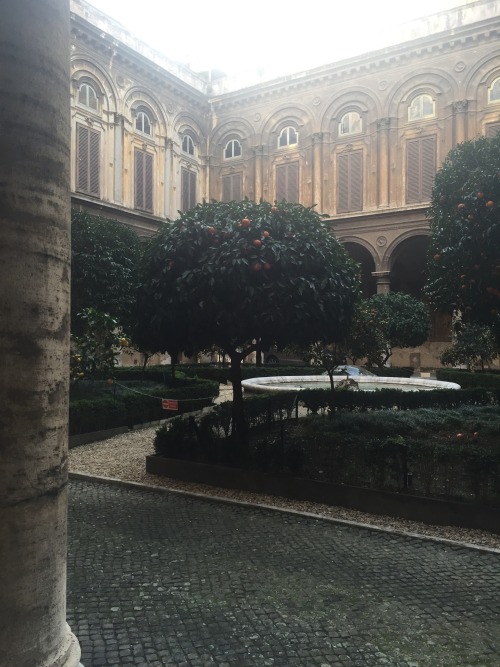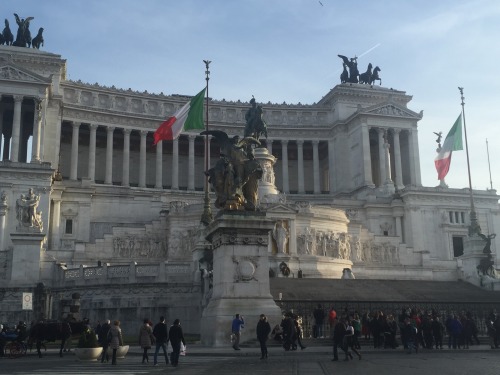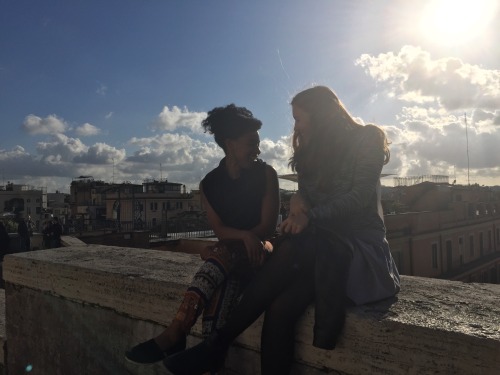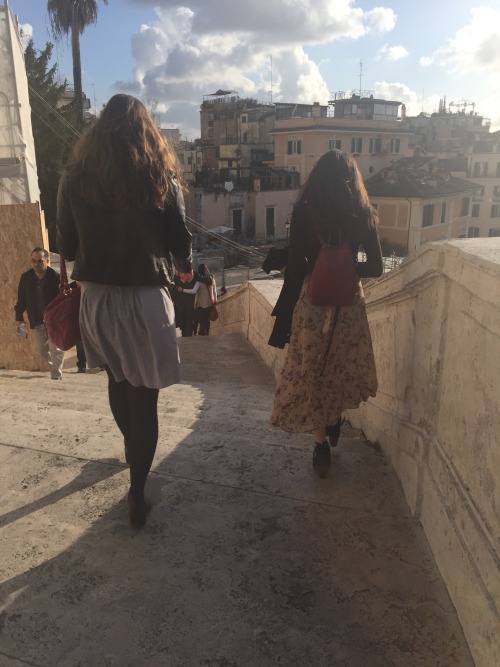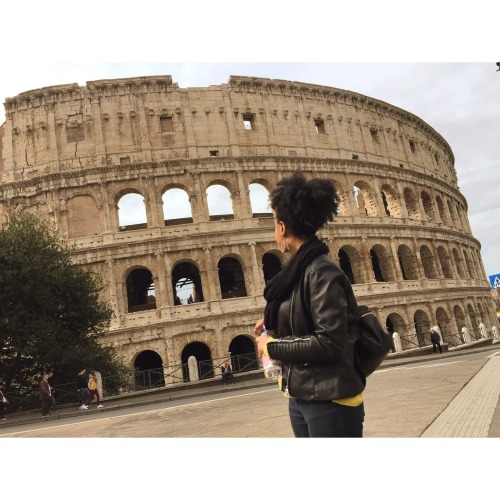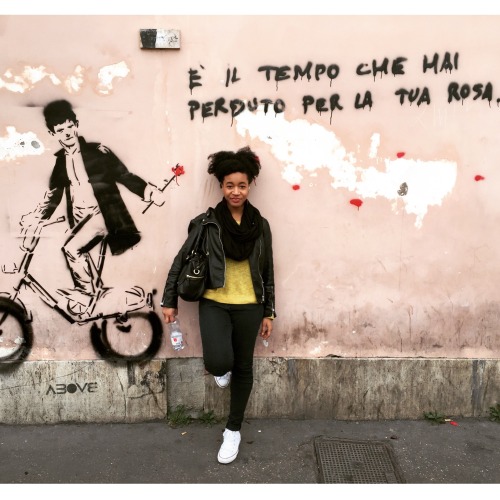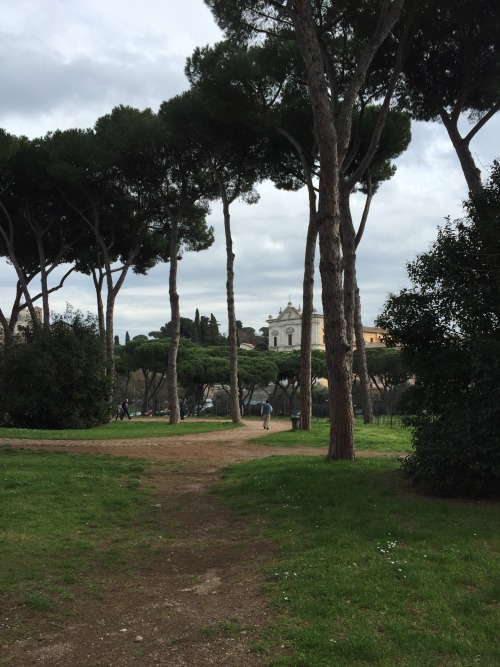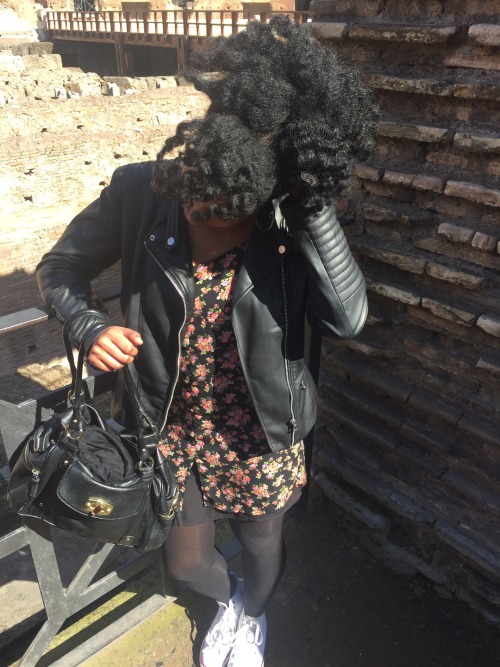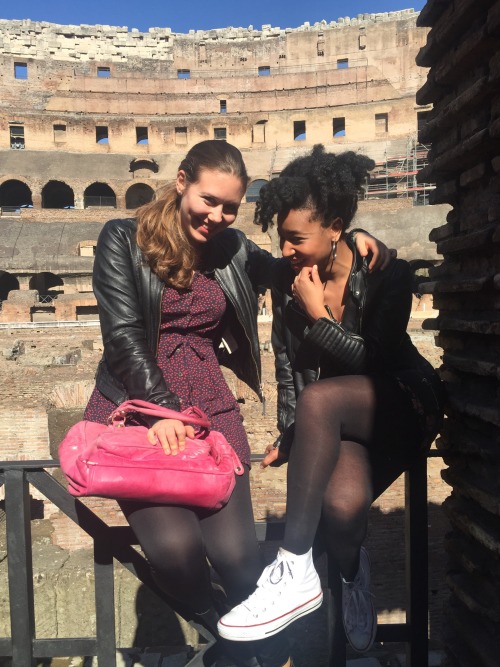#travelnoir
I, Anndi, am a serious foodie. About 99% of the reason I ever leave my house is to try new food. Since the city is jam packed with restaurants on every corner, it’s hard to know which ones are truly worth your hard-earned coins. Well I am here to help you! Below is a list of my Top 5 Favorite Places to Eat in Paris.
1. Gumbo Yaya
Fried Chicken? Collard Greens? HUSH PUPPIES?! By far my favorite place to eat in Paris and it has nothing to do with french food. With a cool hip-hop ambiance and cookout style decor, Gumbo Yaya is a great relaxed place to dine with friends. In all honesty, it’s not incredibly authentic soul food (having a southern family I’m a harsh critic), but the fried chicken is BANGIN’ and it beats going to a french KFC any day. It’s fairly priced, with a good sized portion meal being between 11-15 euros.

Pro Tip: Get the Big Homie or the Chicken&Waffle Burger. Thank me later.
3 rue Charles Robin, Metro stop Colonel Fabien (line 2)
2. Ménélik
If you have never had Ethiopian cuisine before, just know it is entirely TOO LIT. Food full of overwhelmingly savory flavors that is meant to be shared among a large group and eaten with your hands (Take lots of napkins). From the authentic ethiopian artwork, multi-colorful tapestries, and mesmerizing east african music, this spot bathes in authenticity. The best part is easily the free mystery wine you get before your meal. It will have you feeling good in no time. But if you feel like paying for alcohol, I would try Tej which is a wine brewed with honey.
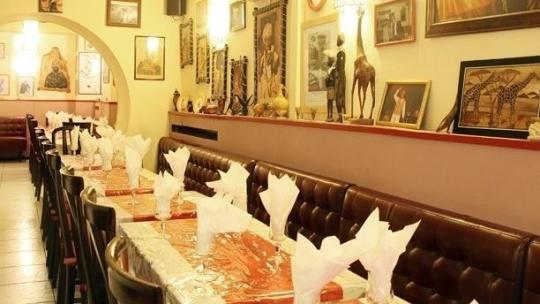
Pro Tip:Ask for more sourdough bread. You’re going to need it.
4 rue Sauffroy, Metro Stop Brochant (line 2)
3. HolyBelly
Oh, HolyBelly. Are we in old town Paris or gentrified Williamsburg, Brooklyn? It took two times of waiting in line for over an HOUR until I actually tried your savory goodness. But boy was it worth the wait! This French-American spot, located at the heart of the 10th, is a hipster haven and has perhaps the best brunch in town. With its impeccable attention to plate presentation, it has the most “Instagram-able” meals in the city. If you order the Savory Stack you will have dreams about it several weeks after.

Pro Tip: Try to get in line before 11am. After that its all over champ.
19 Rue Lucien Sampaix , Metro stop Jacques Bonsergent (line 8)
4. Churrasquiera Galo
This portuguese restaurant has a pretty underwhelming decor and even less impressive service. It’s small and has the community-style seating I loathe quite dearly. BUT the food is awesome!! The portion size is super generous by European standards and you can get a full, hearty meal for less than 13 euros! What’s best is that its located only a 8 min walk away from the Sacré-Coeur in Montmartre, the highest point in the city. It may not be phenomenal in all respects but the food makes it worth a lunch stop after sight-seeing.

Pro Trip:Only go if super hungry. Or wear stretchy pants.
69 rue du Dunkerque, Anvers (line 2), Barbes-Rochechouart (line 4)
5. La Crêperie Bretonne
My absolute favorite french meal is crêpes and galettes. Sweet or savory. I will take them however I can get them. PLEASE resist the temptation to try your first crêpe from a cheap fast food hole-in-the-wall in Saint-Michel and instead opt for one of the many tasty sit-downs on Rue du Montparnasse. This long, narrow street is lined with nothing but restaurants that specialize in this french delicacy. The most popular of these is La Crêperie Bretonne. I personally like to top my crepes with ham, egg, cheese, mushroom, and spinach but you don’t have to start or stop there! You will be overwhelmed by the options. So go here! Your taste buds will thank you for it.
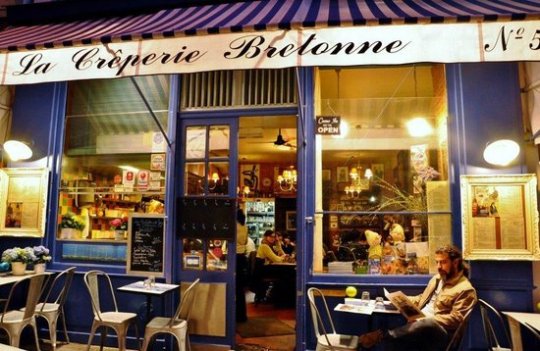
Pro Trip: Cider is the best pairing with galettes (savory crepes). Highly recommend!
56 rue de Montparnasse, Metro Stop Edgar Quinet (line 6), Vanvin (line 4), or Gare Montparnasse (line 4, 6, 12, & 13)
“Ugh I didn’t like France. French people are racist”“Go to Italy! They’re so friendly and I hear they love black women”“Do Germans even have black people outside of the military?”
It’s something almost every black traveller fathoms before venturing abroad. How will my blackness be perceived in this predominantly non-black space? It’s a valid concern. At best, our otherness might put us on a flattering pedestal. At worst, we might get mistreated. Even traveling to remote areas of the U.S you will find people that stare at you and ask aggravating questions like “Can I touch your hair?”. I certainly wondered about how I’d fare as a black woman before moving to France.

But this post is really not justabout me. Yes I am black. Yes I am in Europe. But that really doesn’t make me special. Because even though only a small percentage of African Americans travel to Europe yearly, there are tens of millions of black people that are already there: Afro-Europeans.
Black people don’t just live in Africa and the United States. Thanks (but like, no thanks) to colonialism, the African diaspora truly reaches some of the most unlikely corners of the earth. Most African Americans make the mistake of assuming that we are the only group of african descendants living as the underrepresented, mistreated, systematically oppressed minorities in predominantly white spaces. Tell that to the 55 million Afro-Brazilians. Or the millions of black descendants in the UK, Italy, and France.
But our egocentricism isn’t entirely our fault. I, too, had no idea exactly how many black and brown people lived in Europe until I came here. I assumed based on films, television, and images I had seen growing up that Europe is one homogenous white continent. Full of sameness with very little variation of color or culture (or at least not culture from an ethnic standpoint). It’s the invisible diversity of Europe. In the same way African-Americans lack representation in almost all facets of our society, Afro-Europeans lack it even more.

I had met a lot of people my first couple of months in France but I still felt something was missing. I yearned to connect with people that were like-minded. People in which I had an inevitable bond with. In short, I needed to make black friends. It sounds silly to some but anyone a part of a minority group in some way (race, sexuality, etc) understands this desire.
The problem was never the lack of black people, but how to organically make friends with them. Making friends as an adult is not an easy feat. When you’re a kid it’s so easy! All you have to do is say this:
But how do you tell a random person you think they’re kinda cool and we should hang out in the most platonic way possible without being creepy?
Several months later and I’ve met friends of friends, connected with random people through social media, and have even joined a Black Expats in Paris meet-up. By speaking with people I’ve gathered quite a few perspectives.
African Americans are both admired and envied in France. Believe it or not, we have the type of global visibility not afforded to others of the African Diaspora. African Americans are the examples of cool, the creators of pop culture. Our celebrities are their celebrities, our favorite TV shows are their favorites too. African Americans are vocal in periods of inequality and reactionary during times of social injustice. Mike Brown & Trayvon Martin are not only names uttered on American soil. “I Have a Dream” is familiar to all European ears, the “Black Lives Matter” cry has been heard around world and the Civil Rights Movement is a part of their curriculum just as much as ours. In short, the Black American experience has left a definite mark in world history.
For Black Europeans, however, their history tends to get shoved under the rug. I am not AT ALL an expert on this topic but here is a concise history of European colonization in Africa in my own words.
**Anndi’s Quick and Over-simplified History on the Conquest of Africa**
In the late 1800s, several European countries such as the UK, France, and Portugal had set up port cities in Africa for trading goods and resources. Everything was cool until this dude named King Leopold II of Belgium was like, “you know what would be awesome? My own territory in the Congo”. So homeboy sliced out a chunk of the Congo for his own PERSONAL benefit, not even in the name of Belgium. The other European powers (UK, France, Italy, Portugal, and Germany) started to freak out and thought, “Damn my ego is super big, how can I make it bigger?”. So they had a meeting in Germany, found a map of Africa, and literally cut the continent apart like slices of pizza. It’s worth mentioning that none of the African countries in question were invited to said pizza party. So NINETY PERCENT of the continent was colonized without permission,MILLIONSof Africans were forced into labor, resources were exploited, men were killed, women were raped, children were maimed, feuding ethnic groups were mixed…all under the guise that they were “saving uncivilized savages from eternal damnation”.

Flash forward several decades and the European Powers finally started to leave. Whether they left on their own accord or were driven out by revolutionary groups, the heinous effects of imperialism are evident for several African countries by way of corrupt governments, tireless civil wars, and psychological trauma.
**The End** ….Except not the end because these heinous effects still linger.
I’ve noticed a slight lack in community for Afro-French people. For African-Americans, there’s this idea of fictive kinship. I may not know you from Adam, but if we are the only two black people within a predominantly white space then we will acknowledge one another. But that’s only on a micro-level. On a macro-scale, we have become masters of creating spaces for ourselves. Hair salons & barbershops, Historically Black Colleges and Universities, BET Network, NAACP… we have a black national anthem!! All with the intent of uplifting and strengthening one another, for validating our place in a society not made for us.
But our sense of community derives from our shared experiences. Many of our ancestors were slaves. Many of our living relatives grew up in segregation. For France, and many other European countries, the experiences of black europeans, while similar, are not identical nor are they shared. At any rate, its hard to have a sense of community when you don’t even know how many people of African descent live in your country. Apparently, taking an ethnic census is constitutionally banned in France.
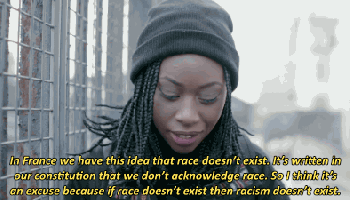
For Afro-french people, they’re not bound together by race as much as their family origins. If you’re a black woman from Guadeloupe, you might feel a bigger bond to people from the West Indies than to those from West Africa. Honestly, I envy greatly that Afro-Europeans know exactly where they come from and even have family that still live in those countries. I have never felt so shameful about not knowing my roots until moving here. Every time I meet an Afro-french person for the first time, the conversation goes as follows.
Them:So where are you from?
Me:I’m from the U.S!
Them:Yeah, I know. But like where are you really from?
Me: Washington, DC.
Them:What’s your family origin I mean to say.
Me:Um…I don’t know? My ancestors were slaves so…
Them:…..
Me:…..Nice meeting you!
In general, there’s this idea that black people are never really from whatever predominantly white country they reside in. Afro-french people can be born and raised in Paris and never feel or be seen as “french”. Even when I meet White Europeans, they are generally skeptical about my origin story but for a different reason. Because I have a lighter skin tone than most Afro-french, many assume that I am “métisse” or mixed. During my trip to Italy, an italian man told me “You’re beautiful. I love mulattowomen”. The assumption really bothers me because black and beautiful are not mutually exclusive concepts homeboy! But I do love their faces of disappointment when I tell them I am proudly, undeniably, 100% BLACK.
But let’s discuss some positives, for there are many. While Black French don’t organize against injustices in the same way we do, that doesn’t mean they aren’t having these important conversations. The Afro-fem movement seems to be really big here. I’ve seen countless articles, youtube videos, tweets, and have even been invited to conferences by Afro-feminists to discuss the interesting balance of race and gender.
I’ve met so many black french women who are smart and woke. Clever and funny. Women who want to be a voice for their community. Women who are artists, poets, and singers. Women who are beautiful inside and out. Women who are writers. Women who are fly. Women who are college educated. Women who want to uplift and strengthen their fellow sisters. Women who want to be a vessel for serious change in their society.

So don’t sleep on Afro-Europeans. They have a very real place in our world.
I would be remiss not to mention the Strolling Series by Cecile Emeke, which was in truth my personal introduction to Afro-European voices. Cecile Emeke is a British woman who brilliantly decided to film black individuals across the African diaspora. The result? Unraveling the generalized blanket of our black experiences into singular, personal threads of testimony. Emeke has filmed in the Netherlands, Italy, Jamaica, and many other countries and its widespread appeal has garnered a huge Youtube following. Of course, you’ll hear the familiar stories of micro-agressions, respectability politics, and self-love affirmation. But you’ll also hear views on mental health, sexual orientation & expression, capitalism, veganism, colonial reparations, and a plethora of other subjects not often heard from black standpoints.
If you’re interested, I would start with one of my three favorites: Two Black Friends in France ,One Black Male Feminist from the UK, orA Black Actress in London.
So what does it mean to be Black in Europe? I have the same answer for someone who would ask what its like to be black in the U.S. There is no simple answer. The culture, the attitudes, the ideas, the joys, the struggles of black people are not monolithic. They are varied. They are nuanced. They may intersect but they don’t coalesce.
I write this to say there is more to the black experience than what you have experienced personally. I think its important not only to have conversations on blackness within the US but in a global context as well. And lets remind ourselves that as Black Americans, our global visibility gives us a certain level of privilege. The next time you say #BlackLivesMatter, mentally expand that demand outside of North America. When you think of the black community, challenge yourself to think beyond your own borders.
And if you’re able, travel abroad. Talk to people. Have these discussions. Your eyes and minds will open wider than you know.

In a city with some of the worlds most famous museums, I found art right on the street
| Rome, Italy |
Post link
Brace yourselves. This is the story of how I made a slow descent into madness.
I met the Maline* family the third day I arrived in France. I had already skyped the mother twice the week prior and had fallen in love with her vivacious spirit. Marie*, we will call her. She was warm and sunny. She had long auburn curls and an infectious smile. I could just tell she was the most popular mom in the neighborhood. She already had two babysitters, but she was looking for a live-in english tutor. She assured me that my *sole* responsibility was to help them with their english homework and babysit them every now again. Weekends were completely mine and I received weekly pay on top of free housing, a phone, and money for transportation. Who would turn down a deal like that?
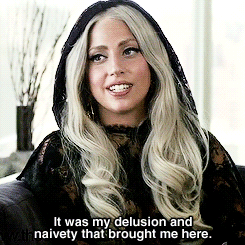
The Warm Welcome
Three months ago, Marie picked up my mother and me from our hotel promptly at noon. Her energy was through the roof. She was excited to meet us and my energy quickly matched hers. Their home was something of Martha Stewart perfection. Every room was immaculate, carefully constructed to allude the perfect balance between elegance and modesty.
Hugging the entire back of the house were 5 shuttered French doors, which on this first visit were completely open to allow in the sun’s natural light. In the backyard were two little boys, ages 6 and 9, bonding over soccer with their father. In the living room was the eldest daughter, age 12, intensely focused, practicing the drums for an upcoming recital.
What I loved most about my surroundings were the decorative artifacts in every corner of the house. Congolese masks in the office, Russian dolls in the den, Japanese art above the oven. They were trying to make a statement, for sure. “Not only are we well traveled, but we fully embrace other cultures within our home!” Honestly I dug it. It was a nice touch to an otherwise vanilla home.
After having a 5 course meal complete with red wine AND Champagne, Marie asked me when I was planning to move home. HOME. Whether this was a result of broken english or not, I took this as a sign that she already saw me as one of the family. I looked over to my mother & had an Orphan Annie moment.
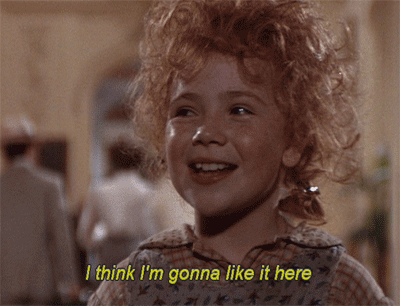
I moved in a couple days later, believing fully that this was the best gift I could have received in my move.
I was wrong.
The Red Flags
The first couple weeks were great. I was adjusting well to my teaching job. The kids were well behaved (for the most part). Marie and I got into the habit of having late night talks after dinner before her husband came come (which was often super late). We would watch TV, laugh, discuss cultural differences & sometimes even share a glass of wine. It was a very relaxed environment. She even encouraged that I go out more.
“You’re young!”, she said. “Paris is a beautiful city. See it every chance you get. Make friends! Meet boys”.
(Looking back on it, these late night talks are what ultimately hurt us. At the end of the day, Marie was my employer. And sharing a glass of wine every night with your employer blurs quite a few lines of professionalism.)
One day, Marie fired one of the babysitters and needed me to drive her kids to and from activities on Mondays and Thursdays. I would have been happy to do so…had the family had automatic vehicles. I had never driven a manual car in my life and I certainly didn’t want to put her kids in potential danger. Because I wanted so badly for this situation to work out, I decided to take driving lessons. I thought it would only take a couple classes…but it didn’t. STICK SHIFT IS HARD. I had to learn how to drive an automatic car, in french, in a country with completely different driving rules. And Those lessons were not only stressful but they were costly (about $90 per class), and the Malines didn’t help me with any of it.

What’s worse is Marie came to the conclusion not to pay me the first couple of weeks until I had gotten my driving together. She somehow convinced me that this was okay.
During a late night heart to heart she admitted that her last au pair quit after only two weeks. When I asked why, she said, “she told me my kids were horrible” and started to tear up. I hugged her and said “I can’t believe someone would say something like that!” But I should have known then.
She was very particular about how I kept my room, which I thought was odd. She asked me to deep clean my room AND my bathroom every Saturday morning (sweep, vaccum, mop, dust, wash and iron my bedsheets etc). Sometimes I even came home to my things put in different places without my permission…
Toussaints Break finally came and Marie insisted I go on a trip somewhere. I decided to go to Barcelona & London with a friend. When I left, a smiling family of five was waving me a bon voyage. When I returned, a monster was at the front door.
Where Everything Went Left
I got back on a Saturday evening from an amazing trip. I couldn’t wait to tell the kids of my adventures. When I rang the doorbell, Marie opened the door with contempt in her eyes. “I need to speak with you”, she spat.
She led me into the kitchen and told. me. off.
“Who do you think you are?!! This is not a hotel!! You can’t just come and go whenever you please!! The room wasn’t clean enough before you left!!! You told me you were coming back in the morning?? THIS IS UNACCEPTABLE. THIS IS A FAMILY, WE HAVE STRUCTURE AND YOU MUST ABIDE BY OUR RULES”
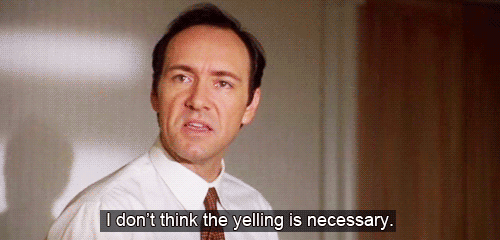
Let me first explain myself. Yes, I did return earlier than I had anticipated. BUT I had informed her of this change THREE days prior on the phone, which in my opinion is ample time. As far as my room not being “clean enough”…I call BS, because I spent a good 2.5 hours making sure that room was spotless.
But she wasn’t yelling at me for those reasons. I knew it. She knew it. I saw through her. She was mad I went on vacation instead of there to help with the kids. Thats it. Just passive aggressive BS.
It was clear she had been planning this speech for days. I stood there awkwardly, confused and upset, trying not to tear up in front of this woman and her whole entire family (including her in-laws who were visiting for the weekend). I haven’t been yelled at like that by another adult since I was probably 12. And thats exactly how I felt in that moment - like a child. No longer was I another adult in that house. And no longer did Marie treat me as such.
After that awkwardness, they all went out for a celebratory dinner with the grandparents. Since the in-laws were staying in my room, I was sent to sleep in the attic. I wish I was kidding.
This Woman Crazy
From that moment on, our relationship was strained. I tried to have several conversations to make amends because I wanted it all to work out. And I can tell she was visibly trying too. But that one conversation ruined everything. She continued to just give me more chores that were not discussed when I interviewed. I did their grocery shopping, their laundry, I cooked. I woke the kids up in the morning, helped them get dressed, did their homework. In short, I became the Help. And from that point on everything I did was wrong. EVERY night, she would come home and have something to say about something. Some times they were valid, most times they were straight up petty and contradictory.
“ Why did you wake the boys at 7:18, they must be up at 7:15! I don’t like the way you load the dishwasher. The french doors should be closed before 6pm. You forgot to set the dessert spoons on the table.Lara’s english is still terrible, you must not be doing a good job. You forgot to mop behind the dresser.My children don’t eat meat at night. Why did the children not eat the chicken I prepared for dinner? Can you make a tuna tart for lunch? What do you mean you don’t know how…I thought you said you could cook? Did you lie about everything? Whats wrong with you? ”

Also, being an au-pair just all around sucks. You are not a glorified babysitter…you are their substitute mother. A typical day went like this:
- 6:30am wake up, get dressed. Open all the french doors
for some reason this was always such a task. Make breakfast and set the table. - 7:15 wake up the boys and help them get dressed. (When said kids are 6 and 9 years old this is easily the most exhausting part of your day.)
- 8:15take them to school
- 9:30am - 3:00pm Go to my own school because I’m a teacher, remember?
- 4:30 pick the boys up from school
- 5:00 snack time
- 5:15 help them with homework
- 5:45 start the laundry/ play games with the kids
- 6:30 start cooking/ make sure the kids take their shower
- 7:15dinner
- 7:45 send them to bed, and read a bedtime story
- 8:15 finish laundry, fold clothes
- 9:00 the time Marie would come home and have a long list of things she felt I did terribly and I would pretend to listen and/or care
- 9:30pm …..

I had to get out of there, ya’ll. I wasn’t sleeping well. I was resentful and mean. I was living with an emotional terrorist. I felt constantly uncomfortable and uneasy. You shouldn’t feel uncomfortable where you lay your head at night. I wasn’t enjoying my abroad experience that way. On top of that, the kids were super rude and disrespectful. I got hit, spit on, and slapped too many times to count. But what do you expect from children who have had 8 nannies and barely see their parents during the week?
In late November, I told Marie that I was unhappy with the job and wanted to leave. She seemed just as enthusiastic at the proposition as I was. She begged me to stay until Winter Break however, because she couldn’t find a replacement. Being the overly nice person I am, I agreed. A couple days later she texted me, TEXTED me, to be out of the house by the end of the week.
Thus began my mad, mad dash to find housing…which I will blog about at a later date. But just know that was the most stressful situation of my life and I didn’t actually find a place to live until one week after I had moved out of the Maline household and only one day before I left for the US for Christmas.
Conclusion
I would never recommend au-pairing to anyone. I agree that I unfortunately got stuck with a bad family situation. But even so, au-pairing is exploitation. These families are taking in young girls typically ages 18-25 that don’t speak their language very well and are paying them terribly. If you’re 18-25 you should spend your time abroad…having fun! Not being someone’s play-mother. Like Marie ironically once told me, “You’re young! Paris is a beautiful city. See it every chance you get. Make friends! Meet boys”.
So I’m gonna do just that.

.
“…My energy just couldn’t stop dancing.
I was caught up in the music of struggle
and i wanted to dance”
- Assata Shakur
Tijuana, Mexico
Giraffe Manor Nairobi, Kenya


